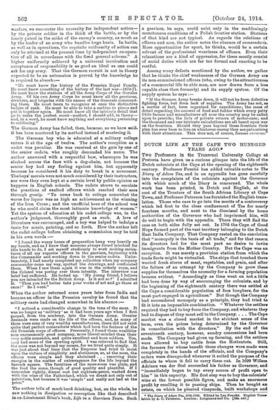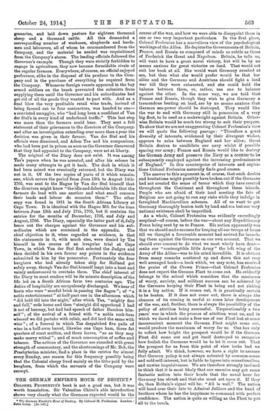DUTCH LIFE AT THE CAPE TWO HUNDRED YEARS AGO.*
Two Professors in the Transvaal University College at Pretoria have given us a curious glimpse into the life of the Dutch colonists at the Cape at the opening of the eighteenth century. Professor Fouche has added valuable notes to The Diary of Adam Tas, and in an appendix has gone carefully into the complaints of the colonists against the Governor with which much of the Diary is concerned. The whole work has been printed, in Dutch and English, at the cost of the Trustees of the South African Library at Cape Town, and Professor Paterson has furnished the English trans- lation. Those who care to go into the merits of a controversy which led first to the close confinement of Tas for nearly fourteen months, and next to the dismissal by the home authorities of the Governor who had imprisoned him, will do well to begin with the appendix. There they will find the case on both sides fully set out. In 1705 the Cape of Good Hope formed part of the vast territory belonging to the Dutch East India Company. That Company rested on the conviction that "monopoly is the basis of all trade," and for that reason its directors had for the most part no desire to invite immigrants from the Mother Country. But the Cape was an exception. It was merely a provision station from which the trade fleets might be victualled. The ships that touched there wanted fresh stores of meat, vegetables, and grain, and after the failure of an attempt by the Company to grow these supplies for themselves the necessity for a farming population became evident. " Accordingly as time went on not a little had been done by way of encouraging the colonists, and by the beginning of the eighteenth century there was settled at the Cape a considerable population of free burghers, for the moat part engaged in agriculture." But though the Company had surrendered monopoly as a principle, they had tried to fit it into an impossible combination. " Whatever the settlers required they had to buy from the Company, and whatever they had to dispose of they must sell to the Company. . . . The Cape market was a closed market in the strictest sense of the term, even the prices being determined by the Governor in consultation with the directors." By the end of the seventeenth century, however, sundry concessions had been made. The Company had given up farming, and the settlers were allowed to buy cattle from the Hottentots. Still, the farmers for whose benefit these changes were made were completely in the hands of the officials, and the Company's orders were disregarded whenever it suited the purpose of the officials to whom it fell to carry them out. In 1699 Willem Adriaan van der Stel succeeded his father as Governor, and "immediately began to tap every source of profit open to him" in this capacity. His first step was to buy the colonists' wine at the lowest possible figure, and make an enormous profit by reselling it to passing ships. Then he bought an estate, on which he planted vineyards, built workshops and • The Diary of Adam Tea, 1705-1708. Edited by Leo Fondle. English Trans. laUon by A. C. Paterson. London: Longman' and Co. [12s. net.]
granaries, and laid down pasture for eighteen thousand sheep and a thousand cattle. All this demanded a corresponding number of workmen, shepherds and herds- men and labourers, all of whom he commandeered from the Company, and the material he needed was requisitioned from the Company's stores. The leading officials followed the Governor's example. Though they were strictly forbidden to engage in agriculture, they now became formidable rivals of the regular farmers. Everywhere, of course, an official enjoyed preference, alike in the disposal of his produce to the Com- pany and in the purchase of everything he required from the Company. Whenever foreign vessels appeared in the bay armed soldiers on the beach prevented the colonists from supplying them until the Governor and his subordinates had got rid of all the goods they wanted to part with. And as a final blow the very profitable retail wine trade, instead of being farmed out to four contractors, was handed to one— a convicted smuggler, who "had long been a confidant of Van der Stel's in every kind of underhand traffic." This last step was more than the farmers could bear. They sent a full statement of their grievances to the directors of the Company, and after an investigation extending over more than a year the decision was given in their favour. Van der Stel and his officials were dismissed, and Adam Tas and his companions, who had been put in prison as soon as the Governor discovered that they had appealed to the Company, were set at liberty.
The original of the Diary does not exist. It was among Tas's papers when he was arrested, and after his release he made many attempts to get it back. The desk in which it had been seized was eventually returned, but the Diary was not in it. Of the two copies of parts of it which remain, one, which covers the period from June 13th to August 14th' 1705, was sent to the Hague by Van der Stel himself that the directors might know " the idle and delectable life that the farmers do lead with one another and what small concern their lands and labour do occasion them." The other copy was found in 1911 in the South African Library at Cape Town. It is identical with the Hague MS. for the time between June 13th and July 17th, 1705, but it contains the entries for the months of December, 1705, and July and August, 1706. The Diary, especially the latter part of it, fully bears out the charges against the Governor and his sub- ordinates which are contained in the appendix. The chief objection to it, when regarded as evidence, is that the statements in it, with much else, were denied by Tas himself in the course of an irregular trial at Cape Town, in which Van der Stel first selected the Judges and then decided in his own favour any points in the evidence submitted to him. by the prosecutor. Fortunately the four burghers who had already taken ship for Holland got safely away, though Van der Stel himself leapt into a boat and vainly endeavoured to overtake them. The chief interest of the Diary to moat readers will be its minute description of the life led on a South African farm two centuries ago. The duties of hospitality are scrupulously discharged. We hear of hosts who were " manful brisk in passing the flagon "; of "a noble entertainment " at half-past one in the afternoon which "did hold till into the night," after which Tas, "mighty fine and full," rode home and then "straight did apprehend I had it not of hearsay, but had had speech of father Bacchus him- eel! " ; of the arrival of a friend with "a noble rock-bass whereof we did partake with relish, and did lard the same with wine" ; of a funeral to which Tas despatched five pails of wine in a half-awm barrel, likewise one Cape ham, three fat quarters of roast mutton, and three loaves, "so as they may make merry withal "; and of much consumption of coffee and tobacco. The actions of the Governor are recorded with great strength of commentary, and the shortcomings of Mr. Bek, the Presbyterian minister, find a place in the entries for almost every Sunday, one reason for this frequency possibly being that the Colonial clergy lived mainly on the tithe paid by the burghers, from which the servants of the Company were exempt.



































 Previous page
Previous page